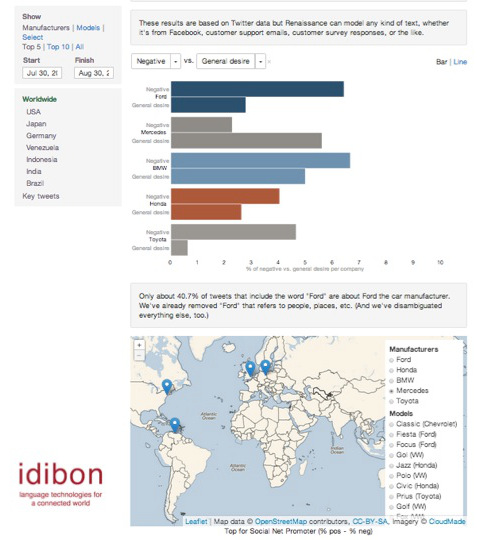A startup called Idibon is introducing software that can help brands spot problems with their products and other trends that people express in tweets, emails, news articles, and other bodies of text — in any language.
The company previously hinted at how it would be able to mine and analyze text in multiple languages, but hadn’t revealed the exact capabilities of its software. Now it has unveiled a series of applications for quickly and accurately pulling nuggets of value out of text. The company spits back neat rows and columns of clean information, including analysis of the emotion hidden in text. Or it can provide a natural-language interface for asking questions of data.
Idibon can align its findings with the data its customers provide to quantify references to very fine-grained information — like individual tiny car parts. And yes, Idibon can visualize it all, too. But perhaps Idibon’s most important characteristic is its ability to very quickly get up to speed on languages it hasn’t worked with yet.
“We can approach a new language in 24 or 48 hours,” Idibon’s chief executive, Rob Munro, said during an interview with VentureBeat at Idibon’s headquarters in San Francisco.
Idibon’s technology could be especially important for companies wishing to succeed while expanding into many countries around the world. Less and less of the world’s digital communications are in English, Munro said. That means companies operating globally will increasingly need to understand in detail the things that people are saying in many languages.
The company uses a big-data approach called natural-language processing (NLP), which entails observing variations on words and linking them with terms that machines understand, in order to find meaning and perceive trends.
Facebook uses NLP for its Graph Search tool and its new Trending feature. Google and Apple rely on NLP for their voice-recognition applications. And it’s in the DNA of IBM’s core Watson capabilities.
But not every business has the money to train Watson on their data. And as far as we know, companies aren’t buying enterprise licenses for Siri.
No wonder services like Idibon have emerged to go somewhere between those. Others that present competition for extracting bits from messy text and returning actionable data include AlchemyAPI, Skyttle, and Stremor.
Idibon strives to be more accurate and more specific than the competition. It can pick up on people’s intent to do things — like buy a car. So if Idibon comes across a tweet like “i’m tired of this old cressida,” it could indicate the user might want to ditch the jalopy and check out newer cars.
Last year Idibon raised $1.4 million in seed funding from Khosla Ventures.
The startup’s system has already worked on more than 50 languages, and it knows how to read deeply into each language’s variations. That’s why it doesn’t take very long to start processing text in new languages. The algorithms do the heavy lifting, but at times Idibon staffers, its customers’ employees, and people from crowdsourcing sites like CrowdFlower step in and tag strings of text, pull out bits of information, and do other things to improve results.
Idibon currently has around 10 paying customers, including car manufacturers and some of the largest consumer electronics manufacturers, Munro said.
Marketing managers at manufacturing companies don’t want to wait 30 days to get clean data on what’s being said about them on social networks and in responses to the surveys they send out, Munro said.
“To get ahead of that, just to know how your product is going, is really valuable for these people, let alone the situation where there has been an adverse event and they don’t know what that is,” Munro said.




